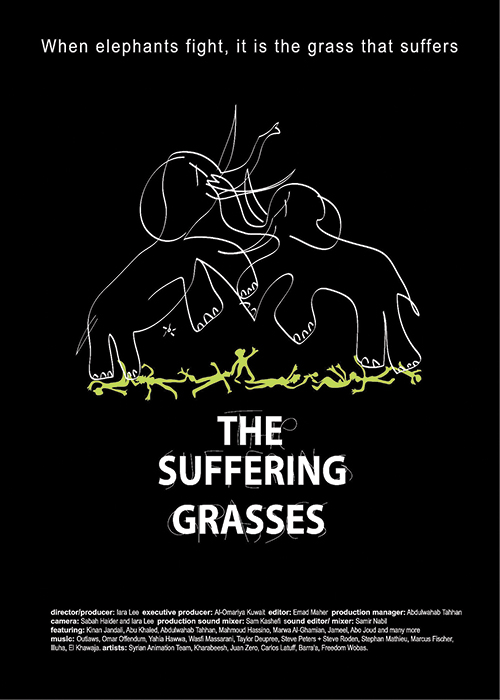The world has always heard about regions in crisis: Germany’s Holocaust, Darfur’s genocide and Mexico’s drug cartel terror are a few prime examples. In an increasingly interconnected world, it is hard to imagine a conflict in one area that does not affect another. On Jan. 24, five PSU student groups will come together in support of one common cause: awareness.
Bringing it close to home

The world has always heard about regions in crisis: Germany’s Holocaust, Darfur’s genocide and Mexico’s drug cartel terror are a few prime examples. In an increasingly interconnected world, it is hard to imagine a conflict in one area that does not affect another. On Jan. 24, five PSU student groups will come together in support of one common cause: awareness.
The Middle East Studies Center, Students United for Nonviolence, the Arab-Persian Student Organization, Americans United for Palestinian Human Rights and MercyCorps will host a screening of the film The Suffering Grasses to shed light on the violence in Syria and to promote the nonviolent resistance movement
in the country.
The film, directed by Iara Lee, exposes the lives of Syrians living amid the violence and provides insight on the number of nonviolent resistance methods Syrians have used.
After the film, hip-hop artist Omar Offendum, PSU international and women’s studies faculty member Taghrid Khuri and Rotary Fellow Steve Nakana will participate in a panel discussion with the audience. The event will conclude with a performance by Omar Offendum.
This event took three months to plan; gathering resources and experts whose research centered on Syria were the biggest challenges. Elisheva Cohen, outreach coordinator for the Middle East Studies Center, explained the importance of knowing about the Syrian conflict: “I think it’s something that people don’t know much about and it’s going to bring a really unique perspective to the conflict,” she said. “Our focus is not on politics but on how the violence is affecting people, the bravery on the ground, and showing the people standing up for themselves and resisting. That is a very important side that we don’t hear very often from Syria, or from anywhere.”
Joy Henry, full-time graduate student and teaching assistant in the Conflict Resolution Graduate Program, has been assisting in the organization of this event. Henry explained that one of the priorities of this event was to help people understand the events in Syria.
“I feel it is vital for films and conversations to happen surrounding conflicts in our world and how nonviolence can help support people’s voices,” Henry said in an email. “When we open our minds we open our hearts, and events like this can help empower people to gain a new understanding and perspective.”
Senior Dana Ghazi, a liberal studies major and women’s studies minor, came up with the event idea. Having only spent two terms at PSU, Ghazi connected with Cohen and helped drive the event’s organization.
From a personal perspective, Ghazi explains there is much more to the events in Syria than people know about.
“What I hope [people gain] from this event is, first of all, bring awareness every day. I have my dad still there, and I know…how difficult it is in Syria now. It’s not safe to even go to universities, and abductions are becoming frequent. Nobody stops their life, though, and life still goes on for these people. They have to endure this every day,” Ghazi said. “The creativity, however, that is coming out of the resistance is not about just violence—it’s about people trying to better their lives and find ways to live justly.”
Seeing Ghazi’s personal connection to the film and the crisis in Syria strengthened Cohen’s desire to pursue the project and gave her a deeper connection with the event and the topics discussed.
“Seeing the film and really working with Dana, the student driving this event, has had a really big impact on me in my sense that this is really important,” Cohen said. “Hearing personal stories and hearing accounts of what’s going on on the ground—how people are in the middle of the winter without any heat or lighting or electricity—is also driving me. Dana speaks so passionately about what is going on because she was there, and that personal connection really had an impact on me.”
“Art and Nonviolent Resistance in Syria,” featuring a screening of The Suffering Grasses, panel discussion and hip-hop performance
Thursday, Jan. 24, 6:30 p.m.
Smith Memorial Student Union, room 296/8
Free and open to the public
This reality is not experienced alone. Henry too has personal connections, not only to this event but to the Syrian conflict.
“On a personal value, this event is close to home for me. My stepfather is from Syria and his entire family is still in Syria. The daily worry has consumed my family’s thoughts. I can see the worry and pain in my stepfather’s eyes,” she said. “His brother waits in line for daily bread to help feed the family. His mother has challenges getting the medication she needs. He has lost extended family members due to the violence.
“Even with all these difficulties, this is not even an area that is currently directly affected with violence. The hardships are being faced all over Syria. His family endures the electricity [being] on for only three-hour intervals at a time, and water shortages are a reality,” Henry said. “I feel helpless, as the children in the refugee camps can’t survive because of the winter’s cold nights. The violence is horrific and is unjust.”
Despite the violence and terror, Ghazi explained the importance of focusing on the nonviolent aspect of the event.
“There came a lot of beautiful expressions out of people’s wanting freedom and I want people to see that, to feel that—to feel that human connection and to realize that this is affecting everyone,” she said. “I want to spread awareness that people living in another society impacts everyone here.”





